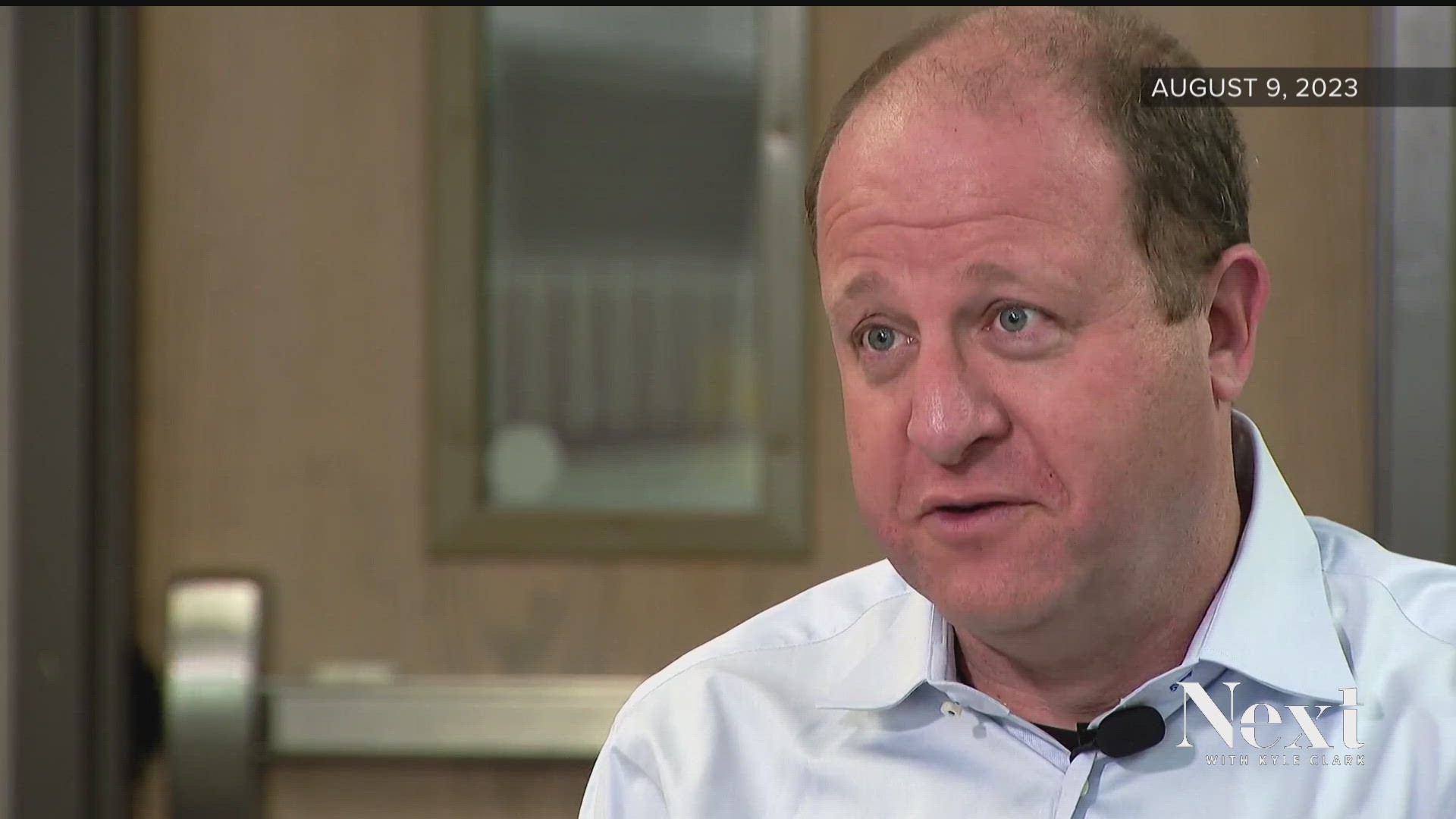COLORADO, USA — Numerous school districts filed a lawsuit Thursday arguing that the set up of the state's new Universal Pre-K (UPK) program prevents them from providing legally required accommodations for students with disabilities.
The lawsuit by several school districts and the Colorado Association of School Executives (CASE) against Gov. Jared Polis, D-Colorado, the Colorado State Board of Education and the Colorado Department of Early Childhood (CDEC) also seeks to restore some funding for 30 hours of Pre-K.
The districts that are suing include:
- Brighton School District 27-J
- Cherry Creek School District
- Harrison School District
- Mapleton Public Schools
- Platte Valley School District
- Westminster Public Schools
Their lawsuit centers on the state's Universal Preschool Program, which gives eligible families at least 15 hours per week of free preschool for 4-year-olds and 10 hours per week to 3-year-olds. The program is administered by the Colorado Department of Early Childhood.
Some families were eligible for 30 free hours of preschool per week if they met a qualifying factor, but at the last minute, the state reversed course and said families could only get those extra free hours if they met two qualifying factors.
This is the second lawsuit filed over the program in as many days. On Wednesday, the Denver Archdiocese filed a lawsuit claiming the program's requirement that participating schools accept applicants regardless of sexual orientation, gender identity and religious affiliation violates the schools' First Amendment rights.
"There have been two lawsuits in the last 24 hours filed against Colorado’s successful implementation of universal preschool which has increased preschool enrollment by 43% and is saving thousands of families $6000 or more," a spokesman for Polis said in a statement. "The administration is confident we can and will successfully defend universal free preschools against these lawsuits."
According to the lawsuit filed Thursday, the state uses a system called BridgeCare to allow families to apply for UPK. Districts do not have full access to that system, and their lawsuit points out various flaws with it and the way families are placed. The system matches a child to a preschool facility, and then the family and preschool must both accept the match before the child is considered enrolled.
BridgeCare matching website concerns
“We wish this were the rosy picture that the governor portrays it to be," Bret Miles, Executive Director of CASE, said in an interview with Next with Kyle Clark on Thursday. “Having the one-stop-shop for the BridgeCare has been, without a doubt, the largest impediment.”
CASE is the statewide organization of public education leaders, including superintendents and school principals. The lawsuit includes six school districts, but there are 178 statewide.
“We didn't spend our time trying to create a big, giant list of a whole bunch of school districts just to be on there," Miles said. “We have six school districts, along with CASE, and the consortium that want to stand up for other school districts.”
The consortium he referenced is the Consortium of Directors of Special Education.
“We have the rules being set up in a way that keeps school districts from meeting their ethical obligations and their legal obligations," Miles said.
Special education concerns
“They've taken it out of the hands of school districts. And school districts are the ones that have the legal obligation to serve children with disabilities," Lucinda Hundley, former executive director of the Consortium of Directors of Special Education, said. “We have been pretty vocal, both orally and in writing with the state for the past three years. We've essentially been ignored.”
On March 14, Hundley was part of a letter that was sent to the Early Childhood director, Lisa Roy, warning about legality concerns with the way preschoolers were being matched without district input.
"If students with disabilities are not identified in a timely fashion, there is the potential for local school districts to be in violation of federal law," the letter said.
“To have an algorithm be matching kids completely bypasses what's called the individualized education program, or IEP process, and that's in federal law," Hundley said.
If the parent declines an initial public school placement, the student "disappears" from the system for school districts. That, according to the lawsuit, prevents a school district from holding a spot for the family if the family prefers to stay on a wait list. For students with Individualized Education Program (IEPs), the system prevents the school district from contacting the family to discuss options to implement the child’s IEP in another location that can meet the student’s needs, the lawsuit says.
The lawsuit also says that school districts have no way to know how many students chose district placement as one of their choices or how many of the students who applied are students with IEPs. It alleges that without full access to BridgeCare, districts cannot meet their obligations to students with disabilities.
Currently, the lawsuit says the Colorado Department of Early Childhood can use BridgeCare to override a school district's local decision and select a service location for children with disabilities. As result, the lawsuit claims that students have been placed in schools that cannot meet their needs.
“They are getting acceptance letters saying, 'you are placed at this school.' We have to go in on the back end and contact families and say, 'actually, that's not correct. You need to go to a different school because that's where your child's IEP can be implemented,'" Bethany Ager, 27J Schools Early Childhood Coordinator, said. “We are relying on a system to place students in schools and in programs without any understanding of what our local rules and regulations are, our school board policies, or what a child's actual IEP says.”
The leaders of 27J Schools, which serves Adams, Broomfield and Weld Counties, are concerned about being sued for not providing the proper education to students with an IEP.
“It's undoing horrible messaging and miscommunication and misinformation from BridgeCare," Ager said.
The lawsuit goes on to say that parents might be giving up some rights for their children with disabilities if they select a private school because those schools are not required to provide the same special education services as public schools. It claims that the parents are not adequately informed about the potential to lose those services.
School districts also claim in the lawsuit that they're having to reject students without IEPs to make sure they can accommodate those with IEPs who may never actually enroll. Aa a result, they're left with empty seats.
They argue that would not happen if they had access to information about who is waiting and the ability to enroll them in the BridgeCare system. They're suing for full access to BridgeCare so they can know which families have not applied and help those waiting find an appropriate match.
Polis sends mixed messages over half day, full day universal preschool.
Funding concerns
The law creating the program allowed for students with a qualifying factor to be eligible for 30 hours per week; however, at the last minute, the state changed that and said only those with more than one qualifying factor would be eligible.
Westminster Public Schools said that as a result of the change, the number of students who qualified for the 30 hours dropped from 254 to just 80.
The lawsuit claims that from the beginning, districts had no way to know which students qualified for 15 hours per week or 30 hours. They said the uncertainty made budgeting difficult because they could not determine how much funding they would get. With the late change, the lawsuit argues, that districts may have to consider terminating staff.
They also argue that the districts may have to absorb the extra costs and provide the extra 15 hours of care without state funding or make families pay, which they argue isn't likely an option because many of those families are low income.
The Harrison School District in Colorado Springs said it has a "large population" of low-income families, many of whom speak English as a second language. They said they believe the process is cumbersome and that some families cannot complete it because they're not being communicated to in a language they understand.
“With the technology that there is out there now, it's realistic that it should be accessible for every student," Wendy Birhanzel, Harrison School District Superintendent, said. “That's an at-risk factor, is a language issue. And so those are the students and the families who need the most assistance, and we're giving them the least assistance.”
The district said it "will not tell" families that have already been promised 30 hours of free preschool that they no longer qualify. As a result, the district said a shortfall of "several million dollars" is expected. Although at this point, the district said it does not know the exact amount of the shortfall because CDEC has not told them how many students qualified for 30 hours to begin with.
“Parents were told if they have at-risk factors they would qualify it for up to 30 hours, which for our district, would be most of our students," Birhanzel said.
“When we started doing the math on the funding, we were really concerned that the funding wasn't going to materialize in the way that it was being promised," Scott Smtih, Cherry Creek School District Chief Financial Officer, said.
Cherry Creek School District is the largest in the lawsuit. It is not offering full-day preschool because it predicted the math problem.
“We are very steadfast in our belief that public money should be spent in public institutions," Smith said.
Enrollment issues
Several school districts said families typically enrolled with the district directly but with the new program, they must go through BridgeCare. Westminster Public Schools claims that in several instances, families told them that they selected a school in the district but were not matched with one.
On the other hand, Westminster Public Schools said it had students match with them, but they cannot accept them because they have to keep seats available for students with IEPs.
As an example, the district said, it's aware of 16 students with IEPs who should have applied to enroll at Gregory Hill, or who have informed they applied to that school. None of them have appeared in BridgeCare.
The district said it is aware of the students because the school district has evaluated them and drafted IEPs for them.
Over concerns about funding, the Brighton School District said it opted to continue with half-day preschool, offering an AM and a PM session. However, the lawsuit alleges, that the BridgeCare system "prioritizes" parent choice, and it allowed families to select morning sessions even if those sessions were already at capacity. That meant that district had to change placements for families.
The lawsuit claims the implementation of the program is unconstitutional and asks the court to take action to ensure that districts can meet their special education requirements and to force the state to restore the original levels promised.
In response to the suit, the governor's office released a statement which said in part, "We will continue to ensure that every Colorado child and family has access to preschool, meet the needs of all learners, and will vigorously defend this landmark program in court so that even more families can benefit from preschool, and this is another reminder of why it’s important that we support Proposition ii." (If passed Proposition II would provide funding from existing tobacco taxes to support preschool programs).
> Read the full lawsuit below:
SUGGESTED VIDEOS: Education stories from 9NEWS


